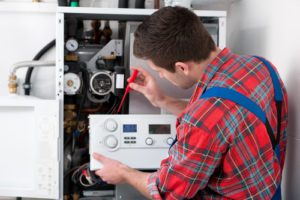Your comfort is nothing to play around with. If you don’t ally with a trustworthy HVAC provider, you might be left in the cold for a portion of the winter. Do business with an elite heating and air provider and you’ll rest easy knowing that your HVAC systems will function without flaw. Here’s how to find the best possible heating and cooling expert.
Look for Qualified HHVAC Contractors
 It takes a bit of research to determine if an HVAC provider is qualified yet the effort is well worth it. Ask each prospect if they have the proper licensing. The provider should be licensed by the state, city and/or county. Do not hesitate to request a copy of the company’s licenses to verify that they are indeed legitimate. Furthermore, the provider should be NATE certified. This is an acronym that stands for North American Technician Excellence. An HVAC service provider who obtains this certification staffs heating cooling technicians who have passed through extensive testing and proven their merit.
It takes a bit of research to determine if an HVAC provider is qualified yet the effort is well worth it. Ask each prospect if they have the proper licensing. The provider should be licensed by the state, city and/or county. Do not hesitate to request a copy of the company’s licenses to verify that they are indeed legitimate. Furthermore, the provider should be NATE certified. This is an acronym that stands for North American Technician Excellence. An HVAC service provider who obtains this certification staffs heating cooling technicians who have passed through extensive testing and proven their merit.
Look for a Heating and Air Provider That Provides a Guaranteed Price
Plenty of unscrupulous HVAC providers roll out bargain basement prices only to renege on them as the project unfolds. Don’t hire anyone until you have a guaranteed price for your project. Sure, some issues might pop up when the actual work is performed yet the best contractors try to minimize such costs. The best provide a contingency that gauges potential costs for issues that arise after the project commences. The price should not be provided over the phone. Elite HVAC providers will perform an in-depth, in-person evaluation to provide a guaranteed quote.
Find a Heating and Air Provider Who is in Good Standing
Read our reviews on the Better Business Bureau and do not hesitate to ask us for referrals from previous projects so you can interview past customers. It is our duty to provide you with professional service that is second to none.
Get a Gauge on the Average Going Rate for Your Heating and Air Project
Do not immediately hire a technician who offers an uber-low price. Determine the average price for your particular HVAC repair, replacement or maintenance project. You might be better served paying more for a provider with glowing reviews, friendly technicians and elite workmanship.
Don’t Settle for Anything but the Best
Though you might be in a rush for a repair, replacement or last-minute maintenance, allying with a second-rate HVAC provider is a mistake! You owe it to yourself and your loved ones to hire only the best for your home heating and cooling needs. Contact us today to schedule an appointment.
Frequently Asked Questions on HVAC Repair
1. What should I consider when choosing an HVAC repair service?
When selecting an HVAC repair service, start by confirming their credentials. Look for licensed providers, as they are mandated to follow specific industry regulations. You should also seek NATE certification for assurance of technician expertise. Remember, the right choice will ensure your heating and cooling systems work efficiently, keeping you comfortable year-round. A trustworthy contractor is essential to avoid future complications, as nearly 30% of HVAC failures stem from improper installation.
2. How can I ensure my HVAC system is working efficiently?
To guarantee your HVAC system is operating at peak efficiency, regular maintenance is key. This includes cleaning or replacing air filters every 1-3 months, checking ducts for leaks, and scheduling annual professional inspections. According to the U.S. Department of Energy, proper maintenance can improve efficiency by up to 15%, saving you money on energy bills and extending your system’s lifespan.
3. What are the common signs that my HVAC system needs repair?
Common indicators that your HVAC system needs repair include unusual noises, inconsistent temperatures, and increased energy bills. If you notice any strange smells—like a burning or musty odor—this could indicate a serious issue. Be proactive; statistics show that delaying repairs can lead to 10-30% higher energy costs and potentially costly replacements.
4. How can I prevent HVAC emergencies?
Preventing HVAC emergencies involves routine inspections and maintenance. Keep an eye on your system’s performance and schedule a professional check-up at least once a year. It’s crucial to clean the unit and replace filters regularly. A well-maintained system can reduce the risk of unexpected failures by about 90%, ensuring you stay comfortable through all seasons.
5. How do HVAC warranties work, and why are they important?
HVAC warranties cover specific repairs or replacements, but many require installation by licensed professionals to remain valid. If a system fails due to a DIY installation or unlicensed service, you could be stuck with the full repair cost. Always confirm warranty details and choose an HVAC repair service that respects these requirements to safeguard your investment. For instance, about 70% of homeowners reported issues after using unlicensed services, losing out on warranty coverage.
6. What is the average cost of HVAC repairs?
The average cost of HVAC repairs varies widely based on the issue and the unit’s size. Typical repair costs range from $150 to $500, with more complex problems (like compressor replacements) potentially exceeding $2,500. It’s advisable to get multiple estimates and to ensure the quotes include a detailed breakdown of potential costs. This approach helps you avoid the pitfalls of “bargain” services that can end up costing you more in the long run.
7. How do I know if I need a new HVAC system instead of repairs?
If your HVAC system is over 10-15 years old and requiring frequent repairs, it may be more cost-effective to replace it. A general rule of thumb is if repair costs exceed 30% of a new system’s price, consider replacement. Additionally, if your energy bills are consistently high, it may indicate inefficiency. A new system can improve efficiency by up to 50%, reducing your long-term costs significantly.
8. What should I do if my HVAC system is leaking?
If you discover a leak in your HVAC system, it’s crucial to address it immediately. Leaks can lead to significant efficiency drops and even health hazards due to refrigerant exposure. Turn off the unit and call a licensed technician for inspection and repairs. Ignoring a leak can lead to issues such as freon leaks, which can cause serious health risks for you and your family.
9. Can I perform HVAC repairs myself?
While some basic maintenance tasks can be DIY, it’s generally inadvisable to attempt complex HVAC repairs yourself. Without proper training, you risk causing more damage and voiding your warranty. Additionally, about 20% of DIY repairs lead to additional issues, resulting in higher costs. It’s always best to consult a licensed technician for any significant repairs to ensure safety and effectiveness.
10. What are the benefits of regular HVAC maintenance?
Regular HVAC maintenance not only extends the lifespan of your system but also enhances its efficiency. Routine checks can prevent minor issues from escalating into major repairs, saving you money in the long run. In fact, homeowners who invest in regular maintenance can save up to 30% on energy costs. Plus, a well-maintained system provides better air quality, improving your overall home comfort.



